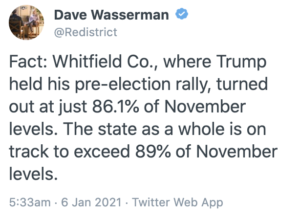Eight Senate Dems Caved, and Caved Too Early
I agree with those who complain that the eight Democrats who voted for a deal to reopen the government caved, and they caved too early. Catherine Cortez Masto, Dick Durbin, John Fetterman, Maggie Hassan, Angus King, Tim Kaine, Jackie Rosen, and Jeanne Shaheen voted for cloture (Shaheen was the leader of the capitulating Democrats).
Jon Ossoff (who is the most vulnerable incumbent in next year’s election) and Chuck Schumer did not.
Start with the timing part. The shutdown was just entering a phase where two things were beginning to cause a lot more pain: airport slowdowns and food stamp cuts.
On the flights, Katie Porter had just cornered Sean Duffy on letting private jets fly while commercial flights were being canceled. He claimed that he had not done that. But at least per WSJ, he has now imposed flight restrictions for private flights.
The Federal Aviation Administration is slated to limit business jets and other private flights to some of the country’s largest airports to ease strains on air-traffic personnel during the government shutdown.
The restrictions are due to begin Monday and will affect private jet flights at a dozen airports, including Atlanta, Dallas-Fort Worth, Denver and Chicago’s O’Hare, according to the National Business Aviation Association trade group.
The FAA’s plan effectively halts business aviation operations at those airports, the trade group said.
“Safety is the cornerstone of business aviation, and NBAA is fully committed to ensuring the safety of the NAS,” Ed Bolen, the trade group’s chief executive, said in a statement Sunday. He added that the group will ensure that business aviation operators understand the restrictions and their implications.
The FAA didn’t immediately respond to a request for comment.
U.S. transportation officials have said that efforts to curb air traffic are designed to alleviate workload on controllers who are increasingly stressed and fatigued after going weeks without pay. Controllers are calling in sick while working second jobs, prompting sharp reductions in air travel with fewer FAA employees to oversee air traffic.
One way or another Porter’s success at magnifying this issue would have shifted (and will, if the deal takes a week to pass, as is predicted) the responsibility for this pain solidly onto Trump. Either Trump’s rich buddies will be prioritized, which will be a pitchfork moment. Or they won’t, which will create the kind of political pressure that works on Trump.
All that said, Duffy says it’ll be some time before flights are back to normal; the shutdown led to increased Air Traffic Controller retirements, so this problem will linger even if government reopens.
Then there’s the matter of SNAP. Trump and courts gave conflicting instructions over the last two weeks about what will happen to SNAP funding for November. It would be provided, then only half would, two judges ruled it had to be delivered, but then Trump appealed, ultimately to the Supreme Court (see Steve Vladeck for an explanation of what Ketanji Brown Jackson was likely thinking when she grated Trump a stay to allow that appeal).
SNAP payments went out to some Dem states — including at least Oregon and Wisconsin — and those states got them out the door right away.
I think far too many people complaining about the cave aren’t considering how SNAP funding offsets the healthcare cave. Millions of Americans were and are going to really struggle to feed their families.
But with a few more days, the fact that Trump chose to do — the fact that Trump is bullying states for sending out food stamp benefits that Trump’s own administration sent out — that would have become more clear.
If you were going to cave, you should have waited a week for all this to play out.
But cave they did.
On the primary asks for this shutdown — health insurance subsidies — they got nothing that hasn’t been on the table for weeks, an agreed on vote at a 60-vote margin, which will fail.
That said, several details about the cave provide means for Dems to regain some leverage about how this cave happened.
If John Thune honors his end of the deal, this cave does add a minibus appropriation funding Ag, DOD, and Congress. The Ag bill fully funds SNAP. Congressional funding restores all the reductions in force that Russ Vought unlawfully imposed during this shutdown. It also fully funds GAO. It does not, however, reverse Vought’s rescissions, thereby effectively ceding the power of the purse to Vought and inviting him to do more of it.
Some of those details — the fully funded SNAP and GAO — are things House Republicans hate. So there’s a non-zero chance they’ll kill the CR based on the inclusion of the minibus, in which case the eight Dems’ attempt to cave will have failed and the onus for the shutdown would shift even more onto the House Republicans than it currently is.
Then there’s the question of ACA subsidies. One thing the eight capitulators did do with the timing of their cave was wait until after all ACA subsidy recipients got their new rates, which will double costs, that start in January. The promised unsuccessful vote for ACA subsidies will happen between those rate hikes and the imposition of those new rates in January. While the vote for ACA is virtually certain to fail, the timing of it will make it more clear to ACA recipients that Republicans are responsible for the pain — either in the form of giving up health insurance, or crippling price increases — they’ll be feeling in January.
And that will happen just before this CR expires at the end of January.
There’s a non-zero chance that the government will be back in shutdown then, though with a few of the hostages — most notably, 40 million SNAP recipients — now protected by these minibus appropriations.
And that will happen in the wake of one and possibly two more politically fraught developments.
When Mike Johnson brings back the House — after their two month paid vacation — to vote on this, he will presumably finally swear Adelita Grijalva in, meaning we’ll also finally see a vote on the Epstein files (which, rumor has it, are worse than we imagine).
It’s also likely that Trump will be dealing with the aftermath of the SCOTUS decision on his tariffs, which is likely to rule that Trump unlawfully and unilaterally taxed importers. The revenue from tariffs that John Sauer falsely argued weren’t about generating revenue has served as cover for the tax cuts right wingers gave billionaires last summer, and if they’re overturned it’ll make the fiscal recklessness of the Big Ugly Bill (also the source of the cut ACA subsidies) more apparent. Still worse for Trump, if he loses, he’ll be faced with the prospect of paying back around $200 billion in revenues raised, starting with the five named plaintiffs in the lawsuit, and then likely moving onto those who sued in advance of any SCOTUS decision. Last week, Neal Katyal suggested that maybe Congress could help Trump out of the problem he caused, which is laughable — but if he tried it, it would change leverage calculations around the next CR expiration in less than 60 days.
And that’s all before any crash in AI stocks, which some are predicting. That could cause a major financial catastrophe.




